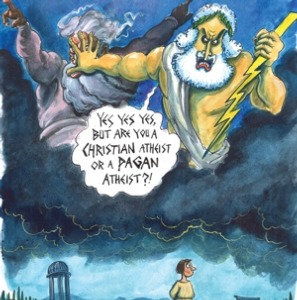Burqas, faith schools, the Pope – wherever you look it seems as if religion is lurking, waiting to pounce. So if it’s such an important concern to so many people, how do secularists respond? And how can we lay claim to any ethics, when religion seems to have hijacked many of the very best human ideals, like hope and charity, sacrifice and even love? The answer is to reclaim good moral values – as Eve Garrard does when she advocates the power of forgiveness as a humanist rather than a Christian concept.
Rationalists, free thinkers, and atheists all rely for their philosophies on reason and evidence rather than superstition or blind faith. This can lead to some unexpected conclusions. It’s been accepted as unarguable, for example, that Jewish and Muslim slaughter of animals is barbaric, and that it’s far more humane to stun them first. But, argues physiologist Harold Hillman, this assumption just doesn’t stand up to scrutiny. Having worked with numerous human victims of torture by electricity, he believes that electrical stunning causes excruciating pain. His findings are a warning that those who oppose religious practices do their cause no good by harbouring prejudices of their own.
It’s a warning that might have particular resonance in China. Writing from Beijing, Sam Geall finds that tensions there between the official endorsement of science as a cornerstone of development and the state’s determination to keep a tight lid on dissent have resulted in almost routine instances of fakery. And more tensions are uncovered by Susie Linfield, who examines what happens when humanitarian aid efforts are pulled into political conflicts.
Meanwhile, we confront another dilemma for secularists: whether Britain should follow the example of France and ban the burqa. Read our powerful debate between two leading commentators, Yasmin Alibhai-Brown and Kenan Malik.
But we wouldn’t want you to think that all we do is fret and worry. You can laugh with Stewart Lee, the brilliant stand-up comedian and writer of Jerry Springer the Opera, meet the forthright “philosophical plumber” Baroness Mary Warnock, and be inspired by the story of a woman who through intellect and guile achieved the highest status in the world: she became Pope.
We also pay homage to today’s Pope. To celebrate his visit to these shores in September we invited a specially selected panel to suggest what they’d like to say to him – read the views of Richard Dawkins, Claire Rayner, Ben Goldacre, Carrie Quinlan, Francis Wheen, Ralph Steadman and many others.
Finally, thanks to our friends at the New Statesman for a delightful reminder. According to a piece by their one-time culture editor Anthony Thwaite, New Humanist were the first publishers in the UK of Philip Larkin’s great poem “This Be The Verse”, in 1971 (you may know it by it’s more recognisable first line “They fuck you up, your Mum and Dad…”). Thwaite admitted that Larkin had first submitted it to the Staggers, but he timidly declined to publish, thinking it “needlessly coarse”. When it was sent to us we, naturally, grabbed the chance.
Thwaite also finds space to describe New Humanist as “a rather bleak and cheerless organ”. Bleak and cheerless? Us? Read on and decide for yourself.

